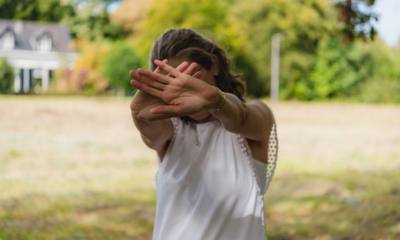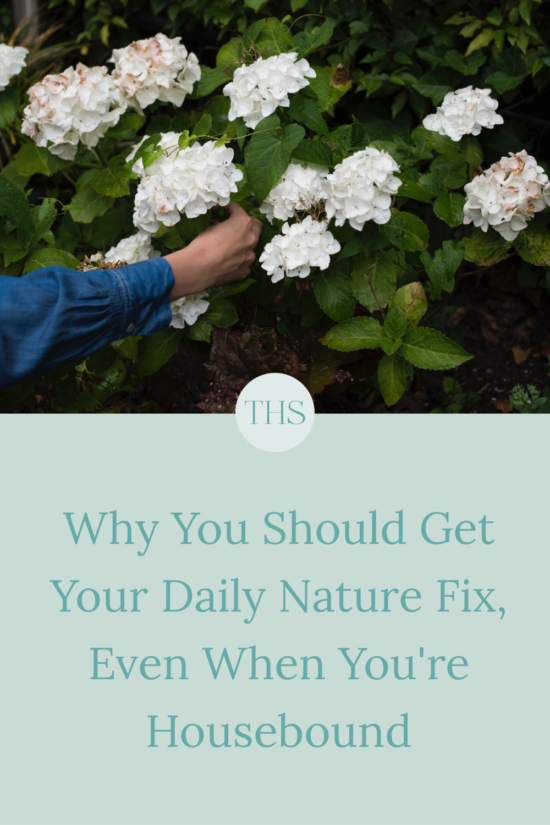Living with Limitations: How to Set Healthy Boundaries and Communicate Them

“There’s no WiFi in the forrest, but you will find a better connection.”
We spend most of our waking hours indoors, working, driving and staring at screens. When you become chronically ill and don’t have enough energy or mobility to go outside, you can get even more alienated from nature.
Science backs our intuitive feeling that being outdoors has many important benefits for our health and happiness. Japanese medicine even studies the healing effects of immersing yourself into the woods, a practice called ‘forest bathing.’
So what makes being in green surroundings so healthy?
Did you know that indoor air quality is usually far more polluted than outdoor air? By spending time outdoors you literally get a breath of fresh air. And when you safely expose yourself to sunshine, your body produces vitamin D, a crucial nutrient for developing strong bones and staying mentally healthy.
We all have an internal clock that makes you sleepy when it’s time to go to bed and wakes you when a new day starts. But artificial light, especially the blue light coming from electronic screens, can make your brain think it’s daytime and suppress the secretion of sleep hormones. Studies show that going camping in nature can reset your circadian rhythm. Taking in bright light in the morning and being in a dark environment by bedtime helps to normalize your sleep patterns.
A lesser known benefit from spending time in nature is the positive effect it has on your eye health. Staring into a distance combats the strain on your eyes from looking at screens all day, a habit that seems related to nearsightedness and eye fatigue.
We’ve all experienced how going for a walk on the beach or in the woods can clear your head. But there’s more to it than that: being in natural surroundings lowers your blood pressure and pulse rate, calms your nervous system and decreases your cortisol levels.
Less stress equals less anxiety, depression and tension-related symptoms. But spending time in nature also boosts your mental health in other ways. Low levels of vitamin D are linked to depression and mood disorders. Exposing yourself to vitamin D – producing sunshine helps to improve your emotional wellbeing. Studies have also shown that green spaces can ease brain fatigue and increase your attention span.
It’s clear that getting your nature fix has profound physical and psychological perks, but how can you squeeze a little more ‘outdoor time’ into your days?
This blog post contains some affiliate links to resources you may find useful, at no extra costs to you. All opinions are my own.
One of the easiest ways to enjoy the health benefits from nature is to exercise outdoors. You can cycle to work, go for a walk during your lunch hour or head to the woods on the weekends. Swim in the lake in summer, go for a sledge ride in winter – the possibilities are endless.
But moving your body outside can be harder if not impossible to do when you have physical limitations due to health problems.
So how can you still get your regular nature fix, even when you’re ill or housebound?
1. Look at something green. Studies have shown that patients in hospital rooms overlooking trees are released quicker from the hospital than patients facing brick walls. In fact, the positive impact from looking at natural scenery is so great, that even pictures of landscapes can help reduce anxiety and lower pain levels. So if you’re bed bound, hang a beautiful painting or a large nature photograph where you can see it or choose soothing screen savers for your electronic devices.
2. Adorn your home with plants and flowers. Not only does it brighten your room and boost your mood, but greenery helps to improve your indoor air quality. Check out these 9 air-purifying plants that are almost impossible to kill.
3. Open your curtains and windows to let the natural daylight and fresh air in. Exposing yourself to sunlight also helps you regulate your internal body clock and sleep-wake cycle.
4. Spend time in the garden or on the balcony if you can. Get your hands dirty in the soil, plant fresh herbs in your window box or liven up your patio with colorful flowers. If that’s too taxing for you, you can make it a habit to drink your morning cup of tea out in the sunshine or read a magazine on your bench.
5. Connect with the earth. Simply put your bare feet on the ground for 5 minutes or lay down in the grass and look up at the sky.
6. Go for a short stroll and unleash your inner toddler. Pick flowers or collect stones, chestnuts and leaves. You get added points for bringing your nature treasures home with you as green decorations.
7. Use walking aids or a wheel chair if necessary to go on outings. The beach and hilly terrains may not be your best options when you have difficulties walking, but green spaces such as a park or arboretum are usually accessible. You could also search for wheelchair-friendly nature walks in your area. Perhaps you have a family member of friend who enjoys being outdoors and doesn’t mind helping you get around?
8. Look up at the stars at night. Nothing like nature to evoke awe.
9. Do you live in the city with limited mobility? Swap the concrete jungle for a visit to the park, a botanical garden or even a planetarium.
10. Can’t get outside? Although nothing beats the real deal, you could mimic some benefits of natural daylight by using a Wake-Up Light or light therapy box.
11. Listen to sounds of nature as you fall asleep. Bonus: when you suffer from insomnia, doing this every night also serves as a great cue for your brain it’s time to wind down.
As healthy and natural as spending time outdoors is, compared to being in your climate-controlled, well-isolated house, the fluctuation in temperature and light, the weather conditions and all the different sensations can be too much to handle when you’re ill.
To be able to enjoy being outside, try to identify what bothers you the most – light sensitivity, regulating your body temperature, the variation in surfaces – and experiment with ways to overcome the problem.

Heading outside can be challenging when you’re living with chronic illness. But hopefully these 11 tips have given you some accessible ideas to squeeze some nature time into your days, even if your energy and mobility are limited.
How do you like to get your daily nature fix, despite the obstacles of chronic illness?
If you enjoyed reading this article, you may also like Nature Therapy: How to Get in 120 Minutes of Outdoor Time with Chronic Illness and Two Birds, One Stone: 4 Healthy Habits with Multiple Benefits.